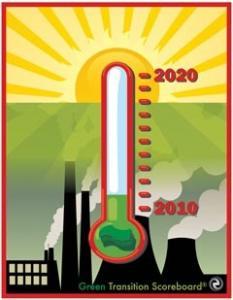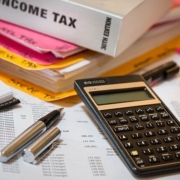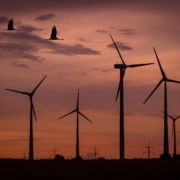The Green Transition Scoreboard: How to Invest for a Steady State Economy
by Rosalinda Sanquiche
We must take some critical steps if we want to build a truly green economy — a steady state that meets global needs without undermining the life-support systems of the planet. Clearly we need to move beyond fossil fuels. We need to scale back the amount of energy and materials we’re consuming, especially in OECD countries. We need to build a durable infrastructure, supportive of a low-carbon future. One way to take these critical steps is through smart investments. With governments stubbornly open to dangerous Industrial Era methods like nuclear power, despite the crisis in Japan, smart investments must come from the private sector. The good news is that private investors are taking a strong lead, as demonstrated by the most recent update of the Green Transition Scoreboard® (GTS).
 The GTS is a tool for tracking private investments in green markets, and the February 2011 update reveals an encouraging $2 trillion worth of investments in the green economy since 2007. This amount is significant because many studies, computer models and reports indicate that investing $1 trillion annually between now and 2020 can ramp up material and energy efficiencies; reduce the costs of wind, solar and geothermal energy; increase sustainable land use and forestry; and support smart infrastructure, transport, building and urban re-design, all of which are necessary to achieve the green transition to a steady state economy.
The GTS is a tool for tracking private investments in green markets, and the February 2011 update reveals an encouraging $2 trillion worth of investments in the green economy since 2007. This amount is significant because many studies, computer models and reports indicate that investing $1 trillion annually between now and 2020 can ramp up material and energy efficiencies; reduce the costs of wind, solar and geothermal energy; increase sustainable land use and forestry; and support smart infrastructure, transport, building and urban re-design, all of which are necessary to achieve the green transition to a steady state economy.
The updated numbers for 2010 put global private sector investors on track to reach $10 trillion in investments by 2020! How can more investments support a steady state? The key is to spur substantial investment in the right sectors. It’s a winning proposition, as smart investing can help societies use fewer energy and material resources and provide needed employment opportunities.
The GTS tracks five sectors:
- Renewable Energy;
- Efficiency and Green Construction;
- Cleantech;
- Smart Grid; and
- Corporate R&D.
Renewable Energy includes private technology development, equipment manufacturing, and project finance. The Efficiency and Green Construction sector includes new building construction and existing building retrofits. Cleantech is a broad sector, encompassing agriculture, air and environment, energy efficiency, infrastructure and storage, materials, recycling and waste reduction, transportation and water/wastewater. Smart Grid includes companies actually putting smart grids in place, building the infrastructure rather than designing the technology. Together, these first four sectors account for over $1.8 trillion in investments since 2007.
|
INVESTMENTS in the GREEN TRANSITION |
|
| Sector | (US $) |
| Renewable Energy | 1,358,937,000,000 |
| Efficiency and Green Construction | 282,011,000,000 |
| Cleantech | 65,024,042,088 |
| Smart Grid | 135,263,000,000 |
| Corporate R&D | 163,813,743,000 |
| Total | 2,005,048,758,088 |
Corporate R&D in green transition technologies alone accounts for over $163 billion in investments. The GTS is the only source of aggregate corporate green research and development investments, specifically tracking R&D dollars for innovative technologies that reduce the use of natural resources and minimize environmental impacts.
Several subsectors, such as nuclear, biofuels and coal carbon sequestration, have been purposefully omitted either because of controversy or lack of consensus that they will make a long-term contribution to sustainability.
Green technologies often draw on available local resources in a more cost-effective, timely manner than dated technologies of the fossil fuel era. The GTS was created by Hazel Henderson, president of Ethical Markets Media, as a public service to help develop the green economy, reform market metrics, and provide due diligence worldwide. Many developing countries where these technologies are of paramount importance lack the resources to compile the data encompassed in the GTS. To provide this information as widely as possible, the GTS is available to the UN agencies spearheading the UN’s Green Economy Initiative.
To meet the challenge of achieving a sustainable and fair economy, investment funds need to be shifted away from ill-conceived hedge funds and dark pools, and away from sectors that depend on fossil fuels. A modest goal for global private investment would be to direct 10% of portfolios to companies driving the global green transition. With the data in the GTS, security analysts can update their asset allocation models to highlight green markets.
The future of the economy will be determined by the investments we choose today. Institutional investors need information like what’s provided by the GTS to make wise decisions. As Ethical Markets Media continues to improve the Green Transition Scoreboard and as green sectors emerge around the world, investors will play a key role in building a 21st century economy that provides prosperity within the capacity of the planet.
—
Rosalinda Sanquiche is the executive director of Ethical Markets Media.




No where do you mention population growth. Without addressing that problem, everything in this post is meaningless nonsense.
This is all nice,feel good stuff,Rosalinda,but it doesn’t move us any closer to what we need to survive as some sort of civilization.
As MikeH says,you haven’t mentioned population which is fundamental.You also have not mentioned nuclear energy which is the only viable and realistic method of generating clean base load power in most parts of the world .Please refer to my two comments on the article by Rob Dietz which precedes yours.
It would be a pity if CASSE became CAFI – Centre for Airy Fairy Ideas.
I like to read about the big numbers, but while they make me feel good, I have found them to be an inadequate focus for real change.
My masters thesis was on community-oriented enterprises and renewable energy, and derived from my interests in such enterprises as food co-operatives, fair trade, and the sustainable cities initiatives. Hopefully, much of those investor related statistics actually represent real developments in green technologies and practices. Such companies as Whole
foods Markets, Intel, and Pepsi and NGOs like the World Resources Institute appear to have made significant investments in some areas, like renewable energy as registered by sites like the EPA Green Power Partners.
Meanwhile, however, a basic trend continues in which large investor activity does not increase participation and meaningful employment. The concentration of retail control by chains like Staples in the US and terms of repair by companies like HP and Toshiba has reduced the ability of independent repair shops to function and support the small business environment which ultimately represents economic social democracy. Economic social democracy is necessary for a steady state economy because without it, socioeconomic inequalities undermine the ability of citizens to think clearly about their options.
Danish citizens´ role in the development of modern wind technology and a French NGO´s role in founding the international organic agriculture organization are two examples of how this dynamic can work effectively. The failure of many US green tech companies during the Reagan years and the legalistic IP assault by GMO corporations is an example of the opposite trend.
I like what I´ve seen of Ethical Markets Media, and would like to see that approach include many examples and trends characteristic of small business entrepreneurs.